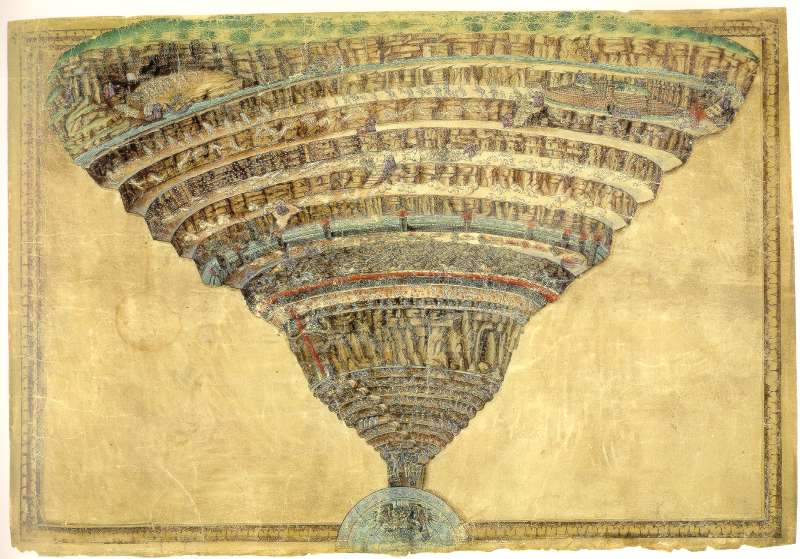Through me the way to the infernal city,
Through me the way to eternal sadness,
Through me the way to the lost people.
Justice moved my supreme maker,
I was shaped by divine power,
By highest wisdom, and by primal love.
Before me, nothing was created
That is not eternal, and eternally I endure.
Abandon all hope, you that enter here.
(Canto 3, lines 1-9)
Imagine yourself wandering, lost, in a creepy forest and suddenly you happen upon Virgil, who takes you to a gateway that has these words hanging over it. Sound like a fun tourist trap? Ehhhh.....
 |
| Botticelli's chart of Hell |
Despite it's ominous first section, The Inferno quickly engaged my interest. I mean, who isn't fascinated by delightful things like demons pecking victims immersed in pitch or heretics entombed in blazing sarcophagi? Yeah, no one, I know. All joking profundity aside, I've often noticed that we humans have an interest in morbidity. Just like the Romans who flooded the Colosseum for the gladiator games and the medieval peasants enthralled by burning heretics, we modern, post-enlightenment, liberated-from-superstition people are still drawn to it. Ever noticed how popular horror flicks or ghost stories are?
The layout of Dante's hell makes the book a masterpiece in and of itself. The entire time I was reading The Inferno, I kept asking myself, "How did this guy come up with this stuff?!" According to the book, Hell is divided into two main sections and three types of sins - Upper Hell (the sins of incontinence or lack of self control) and Nether Hell (the sins of violence and fraud).
In Upper Hell are found those characterized by lust, gluttony, stinginess & extravagance, and wrath. In case you were wondering, no, the punishments here aren't that creative. However, it does contain my favorite: the misers and the spendthrifts, who have been strategically placed in the same circle, are their own punishment. All day long they bicker about the spending of eachother's money (or lack thereof) and throw stones at one another. Brilliant, Dante, brilliant.
The sins of violence come right after the aforesaid circle of the heretics and the people found there aren't quite what you would think of as particularly violent. There's the obvious murderers and suicides, but then there's those who are destructive towards God and the order He designed for His creation - profligates, usurers, blasphemers, etc. By far, however, the largest section of Hell is the sins of fraud. Dante includes a wide range of sins here, including flatterers, hypocrites, sorcerers, thieves, liars, and counselors of fraud.
When I got to the end of the story, I got a major case of heebie jeebies. In the last layer stands a gigantic Satan, whose three heads continually tear up the three most heinous traitors to their lords: Brutus, Cassius, and (dum dum dum!) Judas. Virgil and Dante end up having to climb down Satan's hairy body to get out of Hell. YEESH.
As Dante was a medieval Catholic, most people, as did myself, assume that his book is full of Catholicism. While it definitely is present, the more prominent force is Greek philosophy. For example, Dante got his inspiration for the organization of Hell from Aristotle, whose book on ethics laid out which sins were more destructive than others. Also, it's important to understand that the book is an allegory, like Pilgrim's Progress, and the punishments therin are images of how pernicious sin is in our lives. (Dante wasn't so concieted as to believe that he knew how the otherworld is set up :-) The biggest problem I had with Dante's assessment of which sin is worse than the other is in the beginning. In the first (and least serious) layer he places The Futile - those who knew about Christ but never did anything about it. The Bible clearly states that the sin of unbelief is one of the worst you can commit.
Overall, though, this book is definitely one of my favorites. It made me think. Although I'm unquestionably not a poetic type of person, I have a weekness for epics, and this is hands down one of the best. But I probably wouldn't have appreciated it as much if I didn't read the edition I did - Dorothy Sayers' translation was fun to read (it rhymed!) and her notes brought to my attention many things I never would have noticed. I highly reccomend it!

No comments:
Post a Comment